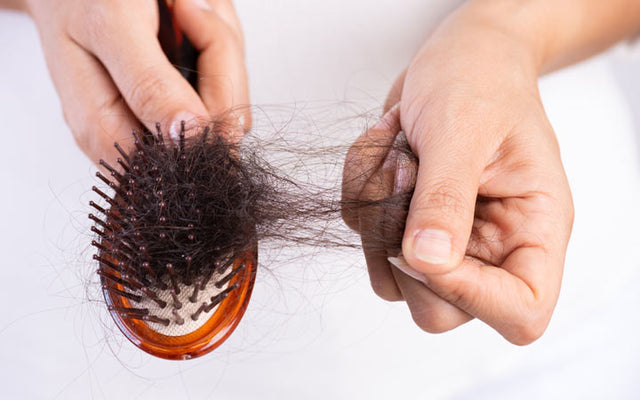Table Of Content

For example, it may take six months or more to see results from Rogaine treatment. If you’ve recently begun taking a new medication and have noticed hair thinning or loss, talk to your doctor about switching to another medication. They may be able to choose a medicine that doesn’t cause the same side effect. Your doctor may also recommend that you stop taking the medication for a few months.
Minoxidil
Try to find ways to manage stress, and strive for a well-balanced diet that includes plenty of fruits and vegetables. A review study published in 2022 found that it significantly increases hair diameter and hair count in patients with several types of alopecia. It typically isn’t covered by insurance, and it can be expensive, Mirmirani says. Hair loss, or alopecia, affects more than 80 percent of men and 50 percent of women, and the risk increases with age.
Topics under Alopecia
Many drugs do list hair loss as a side effect, so don’t be afraid to do your own research online or talk with a pharmacist prior to meeting with your physician. The risk of drug-induced alopecia depends both on the type of medications taken and the individual's response to it. Some drugs are strongly linked to causing alopecia and result in hair loss for most patients who take the drug, while other drugs may cause hair loss in some patients but not in others.

What Medications Can Cause Hair Loss? 46 Known Drugs
However, hair loss will return if a person stops treatment in many cases. A person must answer questions online before connecting with a physician. A person can then get a prescription for hair loss treatments if the doctor thinks it is necessary. Male pattern baldness typically involves progressive hair loss above the temples and thinning at the crown of the head, creating an “M” shape. Hair loss, known clinically as alopecia, is very common and can arise for many reasons.
There are many categories of prescription drugs that have been reported to cause hair loss, and the medications listed below present a risk of temporary hair loss as a possible side effect. Factors such as dosage, duration of treatment, and normal variations in how people respond to medications determine the degree of hair loss that may occur, if any. In most cases, hair growth resumes around three to four months following the discontinuation of the medication. Telogen effluvium occurs when hair follicles are in the resting phase, causing hair to fall out early. Telogen effluvium is more common than anagen effluvium and can develop as a possible side effect of many widely used medications and supplements.
Cancer: Managing Symptoms Discussions
The Price of Propecia: Side Effects of the Hair Loss Drug - MedShadow Foundation
The Price of Propecia: Side Effects of the Hair Loss Drug.
Posted: Mon, 22 Jan 2024 08:00:00 GMT [source]
With about 100,000 hairs on your head, that small loss isn’t noticeable. New hair normally replaces the lost hair, but this doesn’t always happen. If you are experiencing hair loss, you are not alone—35 million men and 21 million women in the United States are also experiencing hair loss. When hair loss is caused by compulsive hair pulling or twisting (trichotillomania), cognitive behavioral therapy (CBT), a form of talk therapy, may be recommended. This therapy involves focusing on the reasons behind why this compulsion developed, and working on strategies to regulate unwanted behaviors. In these cases, you have to weigh the benefits of the drug against the distress you may feel about your hair loss, Dr. Massick says.
Most medications that cause hair loss are initiated or the dose is increased within 3 months of the symptoms. Medications that alter the levels of hormones in the body may also be linked to hair loss in some patients. This includes the oral contraceptive pill, hormone replacement therapy, and androgen therapy. There are also various telehealth companies offering hair loss medication a person can consider. A person should always discuss hair loss with a doctor before trying a new treatment.
vitamin and mineral deficiencies
According to the American Academy of Dermatology, it’s completely normal to shed anywhere between 50 to 100 strands of hair per day. However, if you’ve noticed more strands falling out of your head than normal, you may be experiencing alopecia, the medical term for hair loss. Common diagnoses include androgenetic alopecia, alopecia areata, telogen effluvium, and lymphocytic scarring alopecia, Agbai tells USA TODAY. With some conditions, such as patchy hair loss (alopecia areata), hair may regrow without treatment within a year. Anagen effluvium is less common, but will occur during the anagen phase of the hair cycle, when the hairs are still actively growing. It will prevent the matrix cells, which are responsible for the production of new hairs, from dividing normally.

When it comes to treating drug-related hair loss, the good news is that hair often grows back. Research suggests that drug-induced alopecia is usually reversible once you’ve stopped taking the medication that causes hair loss (Llau, 1995). A common question is whether blood pressure medication can lead to hair loss. However, there are other cases where hair loss occurs prematurely, and that can happen as a result of major illness, poor diet, significant weight loss, childbirth, or even medications. Firstly, a comprehensive medical history should be taken, including all medication doses and changes. This should be observed alongside the reported symptoms and the date that the hair loss began.
Certain health conditions raise your risk of both sudden hair loss (like telogen or anagen effluvium) and progressive hair loss (androgenetic alopecia). Hair loss, known clinically as alopecia, thins hair in some, changes the hairline in others, and can lead to partial or total baldness. But when the body experiences a trauma, sudden, substantial shedding can occur. Triggers can include an acute illness, stress, a severe nutritional deficiency, rapid weight loss — or a drug that proves toxic to hair follicles. Drugs can be the culprit for a condition known as drug-induced telogen effluvium, which leads to increased shedding on top of the scalp a few months after exposure. Traction alopecia is the result of environmental factors, such as wearing your hair in tight hairstyles, Agbai says.
Your thyroid is an endocrine gland located in the front of your neck and serves an important role in your body. It’s in charge of producing and releasing the endocrine hormone into your bloodstream. Endocrinologist Mary Vouyiouklis Kellis, MD, dives into how to know if your hair loss is linked to your thyroid — and what you can do about it. While taking a shower, you look down and notice more clumps of hair than usual circling the drain.
Some small, limited studies have found that certain supplements and shampoos could be helpful, dermatologists say. However, your best bet if you’re suffering from hair loss is to see a board-certified dermatologist who can determine what’s causing your alopecia and then recommend a treatment plan. Here, dermatologists share what you need to know about alopecia, including possible causes, treatment options and what you can do to prevent more hair loss. Infections, distressing events, high fever, and mental health issues can contribute to stress-related hair loss in men and women.
During normal hair cycling, the majority of follicles — around 90 percent — are in the anagen or growth phase, per the Clinical, Cosmetic and Investigational Dermatology study. Read on to learn more about home remedies, vitamins, and essential oils that may support hair growth. If your hair loss is due to a medical condition, the cost of a wig might be covered by insurance. Hair loss takes about three months after starting the medication.
The main symptom of alopecia is losing more hair than usual, but this can be harder to identify than you might think. "Avoid very low calorie diets, or extreme diets, since they often don't provide you with the nutrients you need for hair health," she adds. A typical hair transplant involves removing patches of hair from your head and reinserting the hair follicle by follicle into the bald sections.
Within three weeks of switching to an alternative drug, apixaban, her hair stopped falling out — and eventually it grew back. Hair loss can occur if you wear pigtails, braids or cornrows, or use tight hair rollers. Many people who undergo chemotherapy choose to proudly display their new look. Remember that if you’re going through a tough health situation, you have every right to be proud of how you’re fighting it. It’s entirely up to you to decide the look you’re most comfortable with.

No comments:
Post a Comment